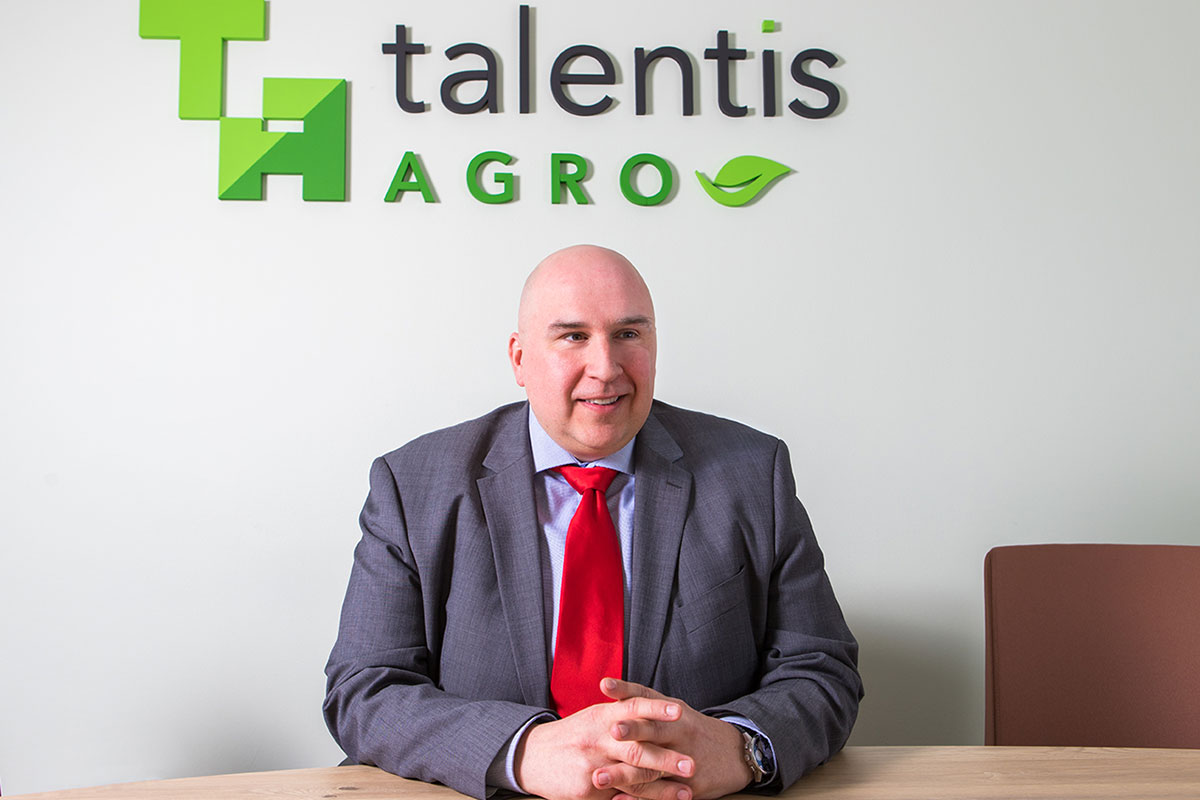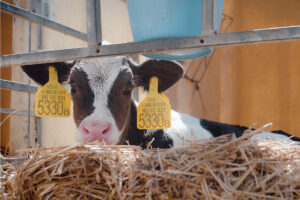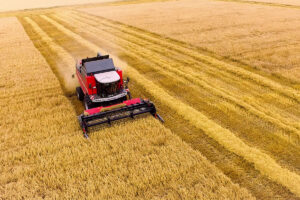
15 Jan Modern and diversified agricultural giant benefits from local and multinational experience
Makai Szabolcs, CEO, Talentis Agro, discusses leveraging Hungary’s geographic, resource, cost and know-how advantages to maximize the country’s potential in agriculture
Talentis Agro is a heavyweight player in Hungary’s agricultural and food sector, having been established for many years and being present in several market segments. Can you give our readers a brief introduction to the business and its key strengths?
Talentis Agro is part of the Mészáros Group. The owner of the Mészáros Group decided to put his agriculture interest together into one holding group and that is Talentis Agro. It was established in 2018, so it is quite young, but all the companies that make up the holding group have been operating in the market for some time and have a strong reputation already. In total, it includes 40 legal entities.
2019 was the first fiscal year for Talentis Agro holding and we posted a €62-million revenue and €11-million profit, which we are very proud of. We are one of the biggest agro holding groups in Hungary—we have 45,000 hectares of land, making us the market leader in the country. To put this in perspective, Hungary has 5 million hectares of arable land. We are the biggest player in Hungary on the farming side. We have over 7,500 dairy cows and are the biggest milk producer in Hungary with an output of about 65-70 million liters a year. 50 percent of our production is exported, mainly to Italy, but it is used also for domestic consumption. We also have 300,000 laying hens, producing 65 million eggs per year, as well as pig production with about 2,000 heads.
In addition to that, Talentis Agro exploits two wineries, one of them in the Tokaj region that produces mainly sweet wine and another in the region of Lake Balaton. We produce different kinds of wine, such as dry, red and white. We also have a flour-mill business, as well as a bakery and a hunting division.
Altogether, the holding group employs more than 1,000 people, which is quite big for a country like Hungary. We are continuously growing. Just recently, we had an acquisition and added another 2,700 hectares and 800 cows to our portfolio. We also have a factory where we make cheese, which is brand new and came from that acquisition. Traditionally, we were producing only raw materials and raw food, such as milk, eggs and meat, so this is the first time we have had an added-value food factory. The factory is brand new and we have just started to sell, but the product is pretty good. We’ll be positioning our cheese as a super-premium product and are working on this with Italians, who are pretty good at cheese.
Talentis Agro is quite a big group in Hungary, but the brand isn’t known to Hungarians as we don’t have a product under this brand. Our wine brands are quite known, but Talentis Agro itself isn’t selling under its brand name.
Within your diversified portfolio, what are your current priorities for further growth and expansion?
Talentis Agro has a diverse portfolio and, therefore, cannot be a market leader in every segment. We have identified three priority areas where we really would like to grow and be a market leader—in Hungary first, before targeting Central European markets. The first area is crop production: corn, wheat and sunflower mainly, that’s 45,000 hectares. The second area is our dairy production, where we operate with a large size and very high yields. The third area, where we are not market leader yet but only ranked as number six or seven in Hungary is the egg-laying industry. Those are the three key strategic segments we are focusing on, although the remaining segments are still very important for the group.
To what extent has the group been impacted by the COVID-19 pandemic?
It has been a terrible time and still is. Nothing has changed since April, and we are still in the middle of the crisis. Talentis Agro was lucky in a way, because we have a contract with milk collectors and food dealers from the milking industry who continued to buy our milk and kept to their word. Therefore, the impact on our dairy business wasn’t too dramatic. At the same time, milk prices dropped because hotels and restaurants were closed and there were no tourists to consume our milk products. That was a disaster, especially during the first wave when it was hard to cross the border with a tanker and bearing in mind that milk can only be preserved for 24 hours, after that you have to dump it. After this, European Union (EU) members agreed that goods traffic could resume and things got better. We also had a lot of discussions with the collectors and dealers around asking them to keep honoring their contracts. Cows are milked every day and that cannot stop from one day to another. There was fair play from both sides and everybody tried to be as flexible as possible so we could manage.
In our crop business, tensions have been more palpable because of the travel restrictions. It was hard to get pesticides across the border and to get our seeds. There was some “panic shopping” in the market—everybody wanted to have pesticides, crop protection, seeds and fertilizers right now, just to have stock. To be honest, we also did the same. We needed to protect our crops and so we bought the products. But at the end of the day, everybody did get their crop protection products and there were no issues. We could survive, we could harvest and put our grain to stores. China bought a lot of crops, making prices go up, which was good news for us as crop producer.
With regard to our winery business, sales just stopped because we were mainly selling to Western European countries that mostly distribute to hotels and restaurants, which were closed. Nobody bought Hungarian wines. All wineries had the same issue, it wasn’t only a Hungarian problem. We still are not at the same level as before. We are back to selling and things are improving, but this isn’t a time where we can make good sales on wine for sure.
As for our milled flour, we also witnessed some panic shopping from customers, so we could sell a lot of flour and now the market is getting back to normal level. So, overall, Talentis survived the COVID-19 pandemic and crisis because of its diversity. Managing the timings and schedule was the hardest part, because we still need to milk the cows every day. Likewise, chickens need to eat every day. We need to protect our crops or harvest otherwise there would be huge damage. We cannot afford to lose our workers on the farm and so we placed huge emphasis on employees’ health and wellbeing—checking their body temperatures, their contacts, having them wear masks and so on. We work in the field, which is quite an open space and safer than many other industries. Besides that, we started to use technology to communicate between ourselves.
We survived without suffering too much loss. The greatest loss we had was in the hunting area, because hunters couldn’t come to Hungary. We lost on our winery and bakery business as well, but managed to weather the damage on the crop side. Yet to be honest, I cannot wait to flip the 2020 page and start a new year. This one has been very stressful.


How would you evaluate the role and importance of Hungary within the EU food and agriculture system? And what are some of the biggest opportunities that exist for investors in the sector?
Hungary is a relatively small country, however it has big agricultural potential. With our arable surface, Hungary can easily feed 20 to 30 million people. And yet there are only 10 million Hungarian living here, so basically we can also feed the surrounding countries as well.
If you check the statistics and compare the corn yield in Hungary to Germany or other European countries, you will find that Hungary has a lot of space to grow. Hungary is still lagging behind, let’s say 1.5 metric tons of corn per hectare, which we see as an opportunity to grow. Likewise, we have an opportunity in special seeds, in special protection and machinery. We need to put our land together because of the size, and so we have a lot to learn from Western European countries like our Austrian neighbors, not so much from the U.S. because it’s so different.
When it comes to animal livestock, Hungary is producing the cheapest animal protein because our raw materials including corn, wheat and sunflower are the cheapest in the EU. We don’t have a coastline, only land, and we are in the middle of Europe, so basically we are the cheapest. We can also produce the cheapest meat due to our animal fattening capacities. That’s also an opportunity for investors—to raise piglets in the Netherlands or Germany, for example, and transport them to Hungary to feed them here. That enables you to have cheap piglets that you can then slaughter in Hungary or elsewhere in Europe. That can be the business and supply chain model: having the most valuable product like piglets in the Netherlands or Germany, and the fattening part in Hungary.
The Hungarian Ministry of Agriculture is really supporting animal husbandry by modernizing farms to have efficient production, which is key because we compete against the Germans and the Dutch. These two countries are very effective in animal husbandry, so we are playing in the same market. If you’re not effective, they will deliver products to Hungary, so we really need be efficient.
We have a lot of farmers coming from the Netherlands and Germany, bringing new technology, new ways of thinking and fattening animals here, so that is definitely a big opportunity. We are feeding 10 million people and doing a bit of exporting, but we are still not using the full potential of Hungary. Talentis Agro really wants to learn and catch up as soon as possible, because we have an opportunity to be the number one player in Hungary and also to learn the new technologies from Western Europe.
How is Talentis Agro contributing to the transformation and modernization of the Hungarian sector?
Talentis Agro is essentially focused on raw material production including milk, eggs, crops and meat: commodity products. We have only made this one factory acquisition, where we basically bought the farming land but the former company owner had decided to build this factory earlier. That’s why we acquired it but we’re not targeting cheese factories or any other further processing factories. Talentis Agro makes raw materials, that’s our target.
The Mészáros Group also has a factory, which processes corn into products like alcohol or sugar. It also process wheat, but this isn’t a customer product.
Labor shortages and declining demography are big challenges for Hungary. How is Talentis Agro tackling the labor shortage?
Talentis Agro has a serious issue with labor. On the one hand, we are faced with a labor shortage, because many people in the western part of Hungary have moved to Austria, because it pays significantly more. On the other hand, recruitment in the agriculture sector is very challenging as this isn’t a attractive sector anymore, especially compared to working for Apple or Microsoft, which sound much better than milking cows starting at four o’clock in the morning.
At Talentis Agro, we have a special program targeting young people to join the group. That’s not easy. We work together with universities to really get the right people in the right place. Attracting blue-collar workers is really not easy, because animal husbandry is a business that knows no Christmas, Easter or holidays. Cows need to be milked every day, they need to be fed every day, they need to be cleaned every day; and that’s definitely not easy. So, we have decided to automate everything, or as much as is possible, as well as to use bigger machines to really be efficient. Labor is not only hard to find but it is also getting more expensive, so we need to invest a lot in machinery and new technologies, to revisit our processes. We need to increase our efficiency and find new solutions against the labor shortage.
You have a very strong background as an agro-economist and marketing specialist, and through your former international experience at Cargill. Having been appointed to lead the group a little over a year ago, what are your key priorities?
I worked for Cargill for 20 years. I decided to change because I wanted to work for a local company and to have a more stable position closer to home. The group decided to take me on to put this holding group together. For me, it was a great opportunity to join to the biggest agricultural company in Hungary and, for Talentis Agro, it was the chance to acquire someone with a big international experience.
One of my objectives was to change the mindset inside the group, learning from a multinational company how to boost our efficiency and how to develop new international connections to sell our products—mainly raw materials outside of Hungary and directly, not through third parties. Our ambition is to become a real Hungarian multinational company—not multinational as we commonly understand it, because it’s still a family company, but to really find a synergy for Talentis Agro to grow upon, leveraging my background and the local Hungarian family background.
I believe it’s been quite successful so far, looking at the efficiency, the yield and also the organization changes. Our 2020 results will be even better than our 2019 results. After only one year, the group is growing and not through acquisitions, but through natural growth. We need to keep it this way, so Talentis Agro can both benefit from my multinational experience and from the local Hungarian culture and know-how.
What are your plans with regard to developing Talentis’ international expansion, exports, collaborations and partnerships?
We work with Italian partners both to sell our raw milk and to make cheese. We are also selling wheat to Italy. But again, that’s just the beginning—we are not targeting Italy as a market specifically, the European market is the European market. If the Italians have shortages in wheat, we will sell wheat to Italy. If the Dutch have shortages, we will sell our wheat to the Netherlands. We also sell to third countries and are applying for international tenders—we sell all the way up to Canada. We have quite a big distribution and target to sell to foreign countries, while keeping a strong domestic leg to keep our balance. We really want to balance the portfolio. We don’t know what’s going to happen in the next year, another pandemic or whatever and that’s why we decide to diversify our portfolio as well. Besides, it’s important for us to ensure a euro income, in addition to our Hungarian forint income.
What are your ambitions for the next 5 years?
My goal is to unify the group and make it one company. There are over 40 legal entities in the group, so I would like to unite them under the same umbrella that is working with talented people and with universities—especially on the research and development (R&D) side—and making the agricultural industry more attractive for youngsters to join. We want to be a major player in the Central European market and would like Talentis Agro to be on a par with other similar Austrian or German companies by achieving the same results in yields and production.
What would be your concluding message for our readers?
I believe that Hungary has huge potential in agriculture because of the size of the land. We have plenty of water as well, which is key nowadays. We have more water than we use, giving us a clear edge when it comes to watering the field and leading to higher yields. Production here is cheaper because of the geographical location of Hungary in the middle of Europe and this translates into great opportunities, such as in the fattening of animals. Last but not least, Hungarian people working in agriculture and coming out of agricultural universities have strong expertise and tradition in this field, and are especially focused on quality. Foreign investors are welcome to come and check out our agricultural R&D facility here as well.


